Puppetry, the art of telling a story animatedly through inanimate objects, has been a medium of communication with a long history in India; it goes back thousands of years. The ancient texts, songs, and folk tales across the country all allude to puppets. The form has been particularly vibrant in states like Rajasthan, Orissa, Karnataka, and Tamil Nadu, where it has enlivened social movements, and caught the fancy of ventriloquists of all shades. Even though string puppets—marionettes with jointed limbs, controlled by strings that lend them great flexibility—are believed to be the most articulate of them all, it is glove puppetry that has found favour with the masses for the simple reason that it is accessible to anyone wanting to put on a show. Also, it’s affordable: glove puppets can be easily prepared from pieces of cloth, papier mache and wood.
‘Hum sab rangmanch ki kathputliya hain, jinki dor upar waale ki ungliyon mein bandhi hai (We are nothing but puppets on the stage, the string handling us is in the control of the Almighty)’ goes the oft-quoted line in Hrishikesh Mukherjee’s 1971 hit film Anand. A decade later, Social Work and Research Centre Tilonia’s Barefoot College, a community-based organisation which has been working for the empowerment of the rual folks in Rajasthan, brought a twist in the tale. Here, the stringed puppets were replaced by glove puppets, and they became powerful entities of communication, addressing the toughest of issues faced at the grassroots in a simple, elegant, and relatable manner.
Going from strength to strength over the last 40 years, these puppets, almost beings of their own, have become extended family members of the villagers they interact with. There is a Jokhim Chacha who educates his village “nephews and nieces” on various government schemes, the Right to Information and NREGA. Chetan Kaki, who is one among the lugaais (women), teaches them about their rights and agitates with them for a cause. Similarly, there is a Dhanni Bua and other relatable ‘relatives’ with interesting, familiar names who connect with the issues of the villages and help them find solutions. Made from recycled paper and scrap cloth, the eyes of the puppets are big and expressive. “Right from the beginning, the Barefoot College initiated multiple activities related to health, education, solar energy, and other requirements of the villagers. There was a need to broadcast this information. That is why a team came together to form the communication department comprising traditional puppeteers, drummers, performers, and ground workers who knew the situation of the villages. The puppets and nukkad naataks we created came handy in explaining the various programmes to the villagers. We use them as a medium of education, storytelling, and entertainment all at once,” shares Ramnivas from the communication team of the 50-year-old Barefoot College.

It was on a trip to Lucknow in that Shankar Singh, one of the founders of the communication department, discovered glove puppets. “I was attending a training in Lucknow where they used glove puppets. I was charmed by them. I requested the organisers to teach me. I wanted to bring this art to Tilonia as people in Rajasthan already understood puppetry. At that time, I couldn’t afford to buy a puppet to show it back here, so I bought a book on puppetry. When I returned, I worked with a painter and tailor. We created some puppets and then wrote a play. The play worked very well. The founder of Barefoot College, Bunker Roy, was taken by our idea and we invited a team from Lucknow to teach us to make and operate glove puppets. Ramlalji in our team was already a puppeteer so it didn’t take him long to catch up. In this way, between 1981 and 86, we created a full-fledged team here,” Singh speaks about the beginnings.
Every day, this team would visit some or the other village and speak to the locals and understand their issues. They’d then create a play about them and take it back to the village. Besides the glove puppets, they made rod puppets, muppets, life-sized puppets, and even giant puppets. While the stringed puppet shows are limited to 50-100 people, these other puppets can reach out to bigger gatherings. Traditional folk instruments like bankia, raavanhatha, dholak, khartal and manjeere accompany the puppets along with folk songs.
Singh continues, “The string puppets were in danger of extinction when we started. But, since the art evolved into more relatable forms, it has sustained. If you watch television, it is a one-way communication. Our communication is two-way. Our puppets talk and hear back! The issues are of the villagers, the puppeteers are also from among them.” Moti is a traditional drummer. Hemnath is from the Kalbeliya community famous for the performing arts. Sattu comes from a community that follows a jajmaani tradition where they participate and perform at weddings in exchange of clothes and grains. Puna Ram is from the Bhat community of musicians. Ramlal is from the puppeteer community. Singh and Ramnivas have a tremendous power of expression and conviction which they bring to the puppets they handle. “None of our team members is highly educated. This is our ‘barefoot’ concept – we don’t believe in degrees and diplomas. We connect with people through our art for our mutual upliftment. When we hold the puppet above the curtain, we can see the audience through the holes we make in the cloth. Based on their response, we involve them in the conversation. The stories we share are our own experiences, but they are not too removed from the lives of the people we perform for,” adds Singh. In their shows, plays and interactions, puppeteers have addressed a range of grassroots issues from water conservation, land, and environment to education of the girl child, women’s empowerment, and caste taboos.
The delightful conversation of the puppets never ceases to engage! One of the many ways in which the team begins is a mutual conversation of the puppets:
Jokhim Chacha (Ramnivas handling the puppet): Main aapko samvidhaan ka sandesh sunaunga! (I will share the message of the Constitution with you.)
Glove puppet of a man (Singh handling the puppet): Aap sunayenge? Chachaji, aap toh kabhi school nahi gaye. Kaise sunayenge? (You will? But Chachaji, you have never even been to a school. How would you?)
Jokhim Chacha: Dekhiye, kuch toh school jaane waale logon se seekh liya. Kuch anubhav se seekh gaye. (See, I learnt a few things from school-goers, and some from my experience.)
Puppet: Toh aap gaane banaate bhi hain, Chacha? (So, you also make songs?)
Jokhim Chacha: Haan, gaane bante hain, kahaaniyan bante hain. Hum sunaayein? (Yes, I make songs, I also make stories. Should I share?)
All other glove puppets (through the people wearing them) nod in agreement.
The group then breaks into the song:
Samvidhaan sandesh ko dil se apnaayenge
Hum bhaarat ke log desh ka maan badhaayenge
(We will adopt the message of our Constitution with all our hearts. We, the people of India, will bring new laurels to the glory of our country.)
The song invariably connects with everyone with its simple, meaningful lyrics and the puppets that seem to sing it. In this way, through a liberal use of local contexts and language, the puppets engage with people.

No question is too big to ask the puppets. Once, rod puppet Jokhim Chacha, Tilonia’s mascot and commentator, travelled with the team to meet UN Secretary General Ban Ki-moon. “There was a script for the event, and we had proper rehearsals. On the main day, when I took Jokhim Chacha to meet Ban Ki-moon on the stage, I asked through the puppet, ‘Sir, we have RTI in India. So many countries sit together in the UN, why isn’t there an RTI here?’ The Secretary General was taken aback as this wasn’t part of the script. Later, the organisers asked me why I spoke out of turn. I simply said, ‘When did I? Jokhim Chacha was in front, he asked. Not I!” Singh chuckles. “How does one counter our white-bearded 365-year-old Jokhim Chacha? That’s his age because he has wisdom for each day of the year! Through Jokhim Chacha I have interacted with the Dalai Lama, the Prince of Wales, prominent heads of states and many other dignitaries. The most important aspect is the love and affection I earn through the puppet,” shares Ramnivas.
When the Dalai Lama visited Tilonia in 2011, he was presented with a glove puppet modelled after him. The communication department at Barefoot College, besides a basic stage to hold performances, also houses different shapes and kinds of puppets. There is one lookalike puppet of Prime Minister Narendra Modi and chief minister Ashok Gehlot who share space with the puppet of superstar Amitabh Bachchan. The Tilonia artistes have their own puppets too which they would proudly wear and greet you with an endearing “Namaste” or “Ram-Ram” before they show you around or put up a play for you.
The puppets often act in an impromptu manner. When the villagers want to highlight the misconduct of any person in authority like the patwari or the sarpanch, they tell the team that comes to perform. The team, through the puppet, gently nudges them during the play – “Sarpanchji dhyaan dein. Patwariji aap bhi sun lein!” (Mr. Sarpanch, please pay attention. Patwariji you too pay heed) and drives home the point. The puppets sometimes go around in the villages, singing about the context of discussion in the local dialect and engaging the villagers with the refrain: Sun lo, bhai-behna (Listen to us, ladies and gentlemen). “If you use it, then it’s a puppet, else it’s just a doll. Through entertainment and satire, we believe in solving problems and encouraging people to be involved in the process of their betterment. When the puppet tells them to take ownership in their own language in a sometimes-funny, sometimes-poignant way, they laugh, listen, get involved and most of all, understand and believe!” concludes Singh.
Activism is a two-way process, and the Tilonia puppets embrace and propagate this message far and wide.
(The writer is an independent journalist and educator based in Ajmer)

















